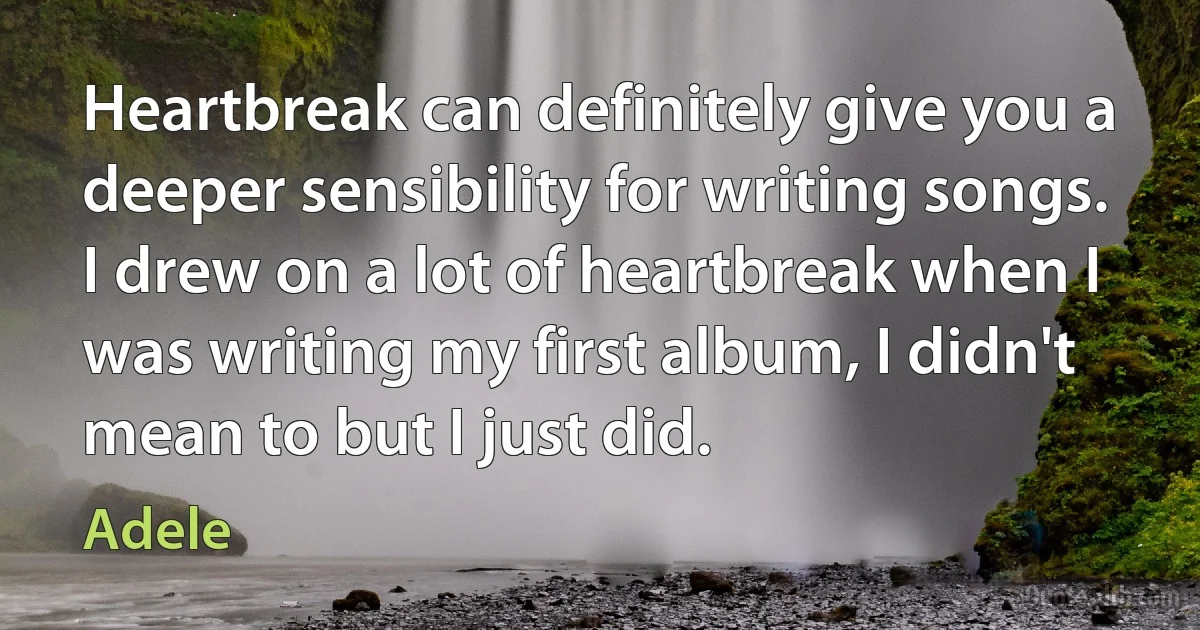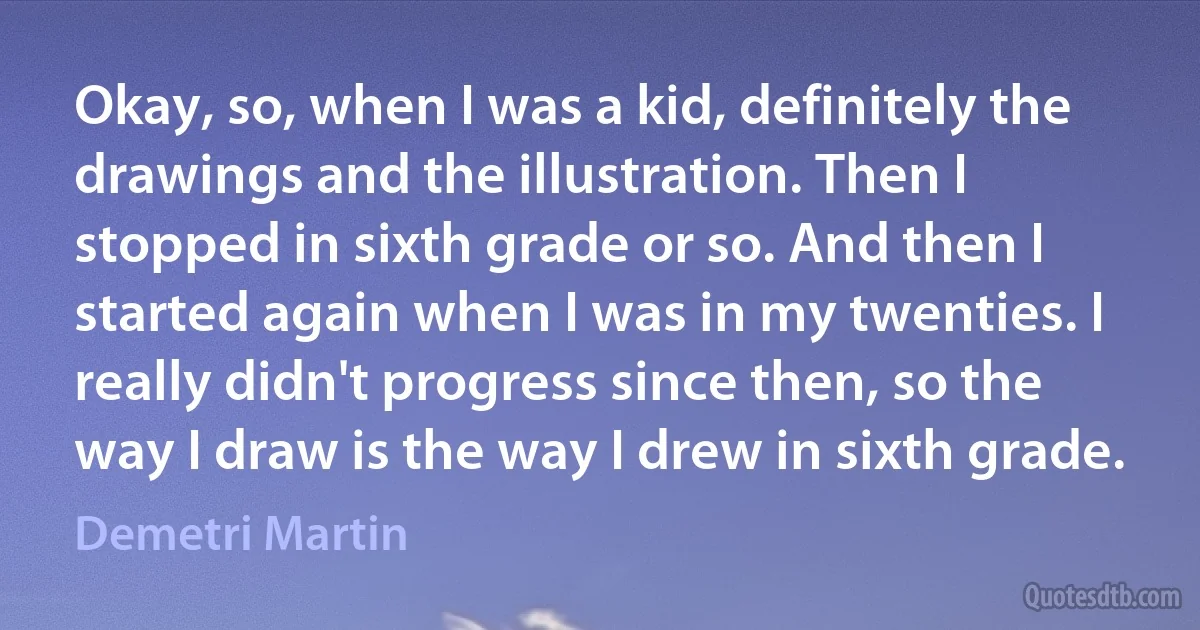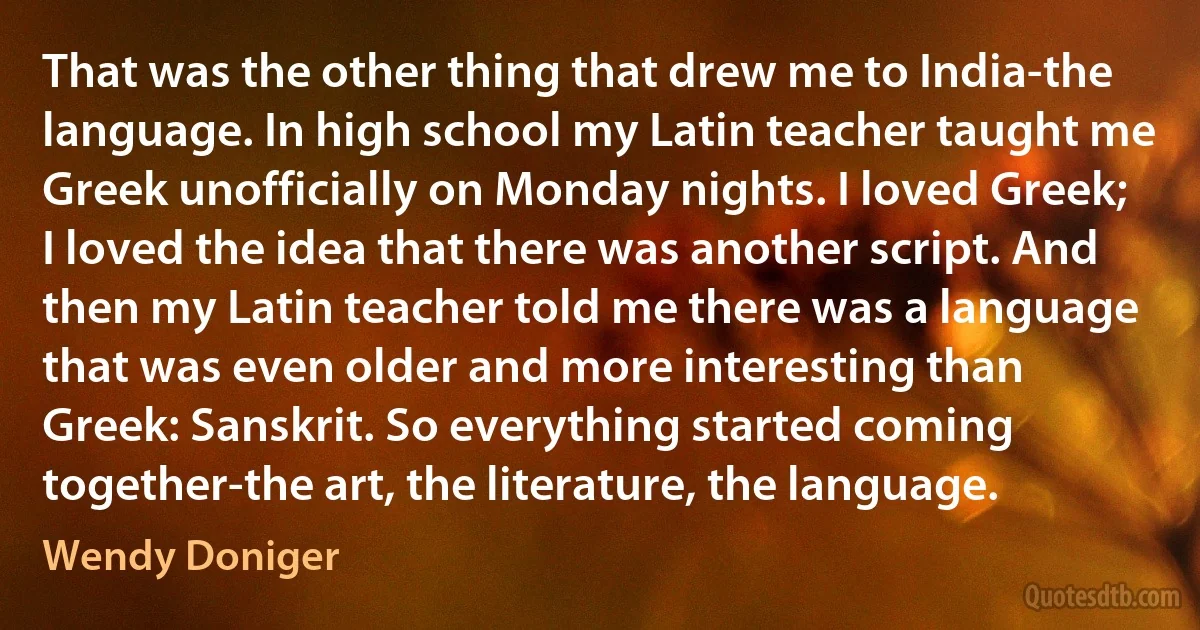Drew Quotes - page 9
He realized that Florentine personified this kind of wretched life against which his whole being was in revolt. And in the same moment he understood the feeling that drew him toward her: she was his own poverty, his solitude, his sad childhood, his lonely youth. She was all that he had hated, all that he had left behind him, but also everything that remained intimately linked to him, the most profound part of his nature and the powerful spur of his destiny.

Gabrielle Roy
The chief marched out to meet his enemy, and fought for three days with the Musulmans. On the fourth he fled, and sought to get back into the city; but the Musulmans reached the gate before the fugitives, overpowered them, and disarmed them. A dreadful slaughter ensued, the women were dishonoured, and the property seized. When Bahira saw this destruction, he fled with some trusty followers to the tops of the mountains. Mahmud sent a force in pursuit, which overtook and surrounded the party, and put all the chiefs to the sword. Bahira saw that no hope was left, so he drew a dagger and killed himself. Mahmud remained in Bhdtia until he had settled its affairs, and drawn up rules for its governance. He then returned towards Ghazna, having appointed a representative at Bhatia to instruct the people who had become Muhammadans.

Mahmud of Ghazni
The Fascist, on the other hand, conceives philosophy as a philosophy of practice (”praxis”). That concept was the product of certain Marxist and Sorellian inspirations (many Fascists and the Duce, himself, received their first intellectual education in the school of Marx and Sorel)-as well as the influence of contemporary Italian idealistic doctrines from which Fascist mentality drew substance and achieved maturity.

Giovanni Gentile
When I was 12 years old, I read 'Nancy Drew' mysteries and biographies of Madame Curie and Florence Nightingale and books about girls who love horses or go to nursing school. I belonged to the Girl Scouts and got A's in school and rarely disobeyed my parents. I still kept a collection of Barbie dolls in my room, and I almost never spoke to boys.

Joyce Maynard
I have not seen Thee, yet I tell Thy praise,
Nor known Thee, yet I image forth Thy ways.
For by Thy seers' and servants' mystic speech
Thou didst Thy sov'ran splendour darkly teach,
And from the grandeur of Thy work they drew
The measure of Thy inner greatness, too.
They told of Thee, but not as Thou must be,
Since from Thy work they tried to body Thee.
To countless visions did their pictures run,
Behold through all the visions Thou art one.

Yehuda he-Hasid
Kuhn had the genius to find the words and sketch the concepts that made important old philosophical problems relevant to the public and newly discussable by philosophers. He had the strength of mind and commitment to lead the discussion. He could speak the truly incommensurable languages of physics, philosophy, and history, all necessary to frame and advance his epistemological quest. He wrote, as one of his admirers, Margaret Masterman, put it, in a "quasi-poetic style," sometimes veiled, sometimes with "rhetorical exaggeration," but always after careful and even painful thought. Or, to switch metaphors, he drew the portrait of science in the manner of the Impressionists. At a distance, where most viewers stand, the portrait appears illuminating, persuasive, and inspiring; close in, where historians and philosophers stare, it looks sketchy, puzzling, and richly challenging.

John L. Heilbron
But I have to tell you what I saw... I had entered a dark room [in the city Tunis], lit by a small, elongated horizontal window,.. The light cut sharply.... and drew itself on the stone floor... There behind the table was sitting the Jewish scribe with his arms forward, leaning on the parchment. He turned his lordly head in my direction... It was a beautiful head, delicate and translucent pale as alabaster, large and small wrinkles were lining along the small eyes and around the big curved hawk nose. A black cap covered the white skull and a low white-yellow beard lay in large tufts over the written parchment... two crutches lay slantingly on the floor beside him. How much I desired to get my sketchbook out.... but in front of the staring gaze of the scribe, I didn't find the courage to carry out my intention.

Jozef Israëls
In September 1979, on Defence of Pakistan Day, there was a long article in the Pakistan Times on Bin Qasim as a strategist. The assessment was military, neutral, fair to the soldiers of both sides. It drew a rebuke from the chairman of the National Commission on Historical and Cultural Research.
"Employment of appropriate phraseology is necessary when one is projecting the image of a hero. Expressions such as ‘invader' and ‘defenders,' and ‘the Indian army' fighting bravely but not being quick enough to ‘fall upon the withdrawing enemy' loom large in the article. It is further marred by some imbalanced statements such as follows: ‘Had Raja Dahar defended the Indus heroically and stopped Qasim from crossing it, the history of this sub-continent might have been quite different.' One fails to understand whether the writer is applauding the victory of the hero or lamenting the defeat of his rival?”.

Muhammad bin Qasim
I have heard that you have found the secret of engraving on copper on white ground, as Elsheimer did. To bite the plate with acid, he covered the copper with a white paste. He then drew with the point down to the metal, which is of reddish color, and it looked as if he were drawing with red crayon on white paper. I cannot remember the composition of this write paste, although he communicated it to me.

Peter Paul Rubens
Once I saw the village butcher [in his youth, in Russia] slice the neck of a bird and drain the blood out of it. I wanted to cry out, but his joyful expression caught the sound in my throat... This cry, I always feel it there. When, as a I drew a crude portrait of my professor, I tried to rid myself of this cry, but in vain. When I painted the beef carcass it was still this cry that I wanted to liberate. I have still not succeeded.

Chaim Soutine
When he advanced from the capital of Karra, the Hindus, in alarm, descended into the earth like ants. He departed towards the garden of Behar to dye that soil with blood as red as tulip. He cleared the road to Ujjain of vile wretches, and created consternation in Bhilsan. When he effected his conquests in that country, he drew out of the river the idols which had been concealed in it.

Alauddin Khalji
Working with David Gordon Green, and Jonah Hill, and Michael Cera, and Drew Barrymore, and all of those people - those are the best people in comedy to work with. Anna Faris. You know, that's my goal, to keep learning and to just keep working with the best people I can. And yeah, we do all hang out, and we all kind of know each other.

Ari Graynor
If in previous decades large historic events drew people together and oriented them toward collective action, the recent double trend toward greater choice but less security leads the young to see their lives in more individual terms. Big events collectivize. Little events atomize.

Arlie Russell Hochschild



